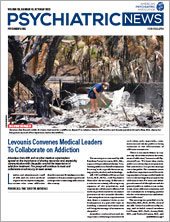Numerous studies have confirmed the significant impact that parental mental health has on the mental health of their children, yet the importance of that connection is often overlooked, said Anish Dube, M.D., M.P.H., chair of APA’s Council on Children, Adolescents, and Their Families. A recent
report emphasized the interconnectedness of a parent and child’s mental well-being and called for more guidance for parents to address the issue with their teens.
The report, published by Harvard Graduate School of Education’s
Making Caring Common project, found that parents and their teenage children report similar rates of anxiety and depression.
“There is a largely untold story about parent mental health in America,” the report’s lead author Richard Weissbourd, Ed.D., a senior lecturer on education with the Harvard Graduate School of Education, said in a
news release.
Weissbourd and his colleagues conducted two surveys in December 2022. One survey was directed to teens (ages 14 to 17) and young adults (ages 18 to 25), while the other was directed to parents or caregivers. Respondents were recruited from NORC at the University of Chicago, a research organization with nationally representative panels of both adults and teens. The survey questions for teens and young adults asked the youth to identify up to two primary caregiver(s) and focused on issues such as their perceived stressors, relationships, view of their parents and schools, and their help-seeking strategies. Much of the caregiver survey directly matched the questions given to teens and young adults.
Respondents reported their anxiety and depression symptoms using the Generalized Anxiety Disorder-2 and Patient Health Questionnaire-2 measures, respectively. Respondents were considered to have anxiety or depression if they had scores of three or more, which is the score at which patients are typically screened for generalized anxiety disorder or major depressive disorder in clinical settings.
In total, 396 teens, 709 young adults, and 748 parents or caregivers responded to the survey, including 321 pairs of teens and their parents. (For the purposes of the report, the researchers categorized all female primary caregivers as “mothers” and all male primary caregivers as “fathers.”) The findings include the following:
•
18% of teens reported experiencing anxiety, as did 20% of mothers and 15% of fathers.
•
15% of teens reported experiencing depression, as did 16% of mothers and 10% of fathers.
•
Teen girls reported higher rates of anxiety (24%) and depression (22%) compared with teen boys (12% and 8%, respectively).
•
40% of teens reported that they want their parents to “reach out more to ask how [they’re] really doing and to really listen.”
•
Teens who reported experiencing depression and anxiety were much more likely to reach out to their friends (56%) than their parents (32%) for emotional support.
•
Among the parent-teen pairs, a lack of awareness among the parents of the anxiety or depression that their teens experienced was strongly associated with depression and anxiety in both teens and parents. “The greater the misalignment, the greater the chances that both parents and teens reported these emotional challenges,” the authors wrote.
Just like a young person’s struggles with mental health impact their family members, so too do parents’ struggles impact their children, Dube pointed out. “This is why, in child and adolescent psychiatry, we emphasize the evaluation of the whole family,” he said. “You’re looking not just at the young person in front of you but at the entire family system and family dynamic.”
Too often the focus in medicine is on the individual sitting in front of the clinician, Dube said. “Yet oftentimes, there is significant interchange between the health of the individual and the health of the systems in which they operate, and that includes families.” ■


